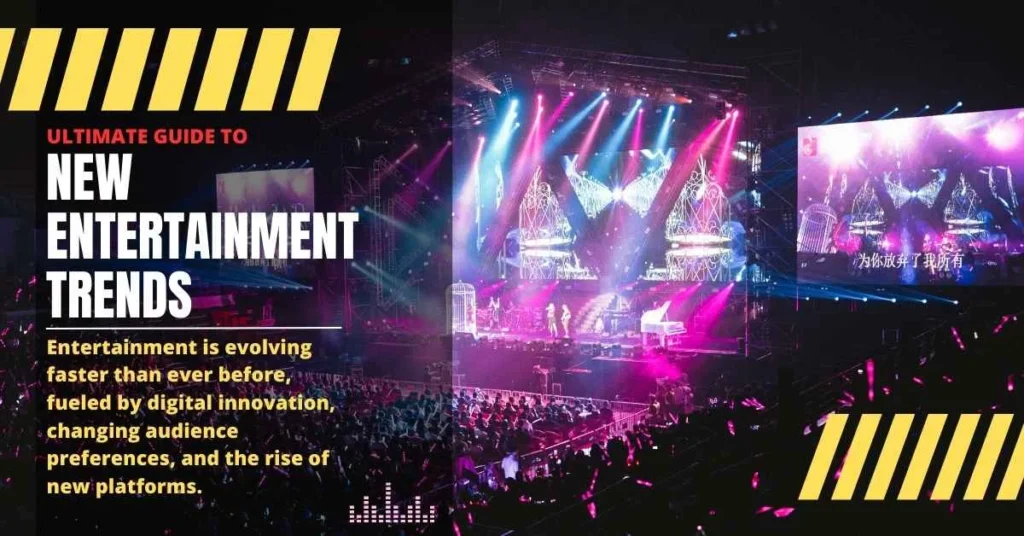Entertainment is evolving faster than ever before, fueled by digital innovation, changing audience preferences, and the rise of new platforms. As we head into 2024, it’s essential to keep an eye on the entertainment industry’s latest trends, from streaming models and virtual reality to the creator economy and the global phenomenon of Korean pop culture. This guide covers all the significant developments that are reshaping how we consume and experience entertainment today.
Rise of Digital Streaming Platforms
The dominance of streaming platforms has transformed the way we watch movies, TV shows, and other media. In 2024, the streaming landscape is experiencing some shifts:
- Economic models are evolving: Rather than focusing solely on acquiring new subscribers, platforms are shifting to profitability models. Many are adopting ad-supported tiers (e.g., Netflix’s ad tier, AVOD). This allows for a lower-cost entry point for consumers while generating revenue through advertisements.
- Consolidation of platforms: With rising content production costs and the saturation of streaming subscriptions, major platforms are merging to streamline content delivery. WarnerMedia and Discovery merging into “Max” is an example of this trend.
- AI-generated content: Artificial intelligence is also starting to play a more significant role in content creation, influencing how media is produced.
Creator Economy and Crowdsourcing Platforms
One of the most exciting changes in entertainment is the rise of the creator economy, where independent creators use platforms like Patreon to monetize their content. This model allows creators to earn steady income from dedicated fans and produce niche content without relying on traditional advertisers or large audiences.
- Patreon’s growth: Platforms like Patreon have seen a massive rise in usage, offering creators a way to directly connect with their most loyal followers. For instance, popular artists and podcasters have turned Patreon into a significant revenue stream.
- Deeper fan engagement: Fans who subscribe to creators on platforms like Patreon often receive exclusive content, which fosters a sense of community and deepens the creator-fan relationship.
Globalization of Entertainment: The Korean Wave
Korean pop culture, also known as the Korean Wave or Hallyu, has taken the world by storm, becoming a global phenomenon in the fields of music, film, and even fashion.
- K-Pop dominance: Groups like BTS and BLACKPINK have become household names across the globe, thanks to platforms like YouTube that make their content easily accessible to international audiences.
- Korean cinema’s global acclaim: Korean films, like the award-winning Parasite, have elevated the country’s cinema to global recognition. This trend is continuing as Korean filmmakers and artists gain more international fame.
- Mukbang culture: Mukbang, a unique form of online eating broadcasts, has grown beyond South Korea to international popularity. It’s a prime example of how Korean trends can influence global content creation.
Short-form Video and Social Media Influence
Platforms like TikTok and YouTube Shorts have reshaped how we consume content by prioritizing short, snackable videos.
- Short-form dominance: TikTok has changed how entertainment is produced, especially in music. Artists now tailor their content for 15-60 second clips, which often leads to viral trends and remixes of popular songs.
- Monetizing superfans: As consumers seek closer connections with their favorite creators, platforms are introducing ways to monetize these relationships, such as exclusive content and limited edition merchandise.
Experiential Entertainment: Immersive and Interactive Formats
Interactive and immersive experiences are becoming more mainstream, largely thanks to advancements in technology.
- Virtual and Augmented Reality (VR & AR): Virtual reality headsets and augmented reality experiences are gaining traction in mainstream entertainment, with platforms and developers focusing on creating more immersive worlds.
- Interactive TV: Shows like Black Mirror: Bandersnatch have paved the way for interactive television, where audiences can choose how the story unfolds. This form of entertainment gives the viewer more control over their media consumption.
- Gaming crossovers: The boundaries between gaming and traditional entertainment are blurring, with video games being adapted into TV shows or movies and vice versa, as seen with The Last of Us.
Live Events & Sports Entertainment
After the pandemic, there has been a massive resurgence in live events and sports, with a few notable trends emerging:
- Live music comeback: With festivals and concerts selling out faster than ever, live music is making a grand return.
- New sports gaining traction: Lesser-known sports like axe-throwing and pickleball have seen increased interest, especially among younger audiences looking for alternative recreational activities.
- Direct-to-consumer sports streaming: Sports leagues are offering more direct-to-consumer options, bypassing traditional cable companies. This trend is expected to continue growing as more fans opt for tailored sports packages that suit their preferences.
Mindful and Wellness Entertainment
With wellness taking a central role in people’s lives, content that promotes mindfulness and well-being is becoming more popular.
- Mindfulness music: Relaxation and meditation music are increasingly being featured on streaming platforms, catering to the growing demand for wellness-oriented content.
- Fitness and entertainment: Platforms like Peloton have seamlessly blended fitness with entertainment, creating content that engages and motivates users while they work out.
AI and Personalization in Entertainment
Artificial intelligence is enhancing the entertainment experience by offering more personalized recommendations and content.
- AI in content creation: AI is being used to write scripts, generate music, and even create films. This shift is likely to revolutionize the creative process and open up new opportunities for experimentation in entertainment.
- Hyper-personalization: Entertainment platforms are using AI to offer hyper-personalized experiences, tailoring recommendations and content based on individual user preferences.
Conclusion
The entertainment industry is undergoing rapid transformation. With the rise of new platforms, evolving business models, and technological advancements, audiences are being offered more ways than ever to consume content. Staying up-to-date with these trends will ensure you don’t miss out on the next big thing in entertainment.
FAQs About Ultimate Guide to New Entertainment Trends Lumolog
What is the future of streaming platforms?
Streaming platforms are moving toward profitability-focused models, with an emphasis on ad-supported tiers and mergers to streamline costs and provide more competitive services.
How are creators monetizing their content in 2024?
Creators are using platforms like Patreon to connect directly with their audiences, offering exclusive content and building communities that generate recurring revenue.
What is the Korean Wave, and why is it significant?
The Korean Wave, or Hallyu, refers to the global popularity of South Korean culture, particularly K-pop and Korean cinema. It has had a massive impact on global entertainment trends.
How is AI being used in entertainment?
AI is increasingly being used for content creation, such as generating music, writing scripts, and offering personalized entertainment recommendations based on user behavior.
What are the emerging trends in live entertainment?
There’s a growing interest in new sports like pickleball and axe-throwing, as well as a resurgence in live music events post-pandemic. Sports streaming is also moving towards direct-to-consumer models.



